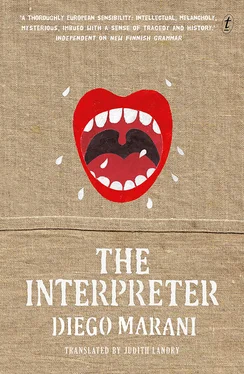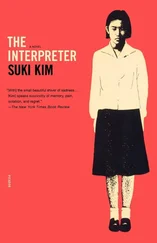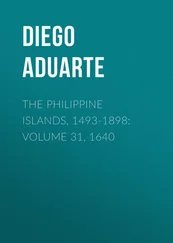‘Mr Bellamy, your cure is not yet complete. By interrupting it, you are jeopardising all that you’ve gained so far. The sense of security by which you are currently pervaded is purely illusory, it is due to the daily salvo of intensive courses you are undergoing — it is not, how should we put it, self-generating. The beneficial effect of intensive Romanian is not sufficiently strongly rooted within you, it cannot yet sway your character. As soon as you abandon the daily gymnastics which support it, your language will once again fall into disorder. You’re courting trouble, Mr Bellamy!’
His solemn tones rang out like a threat, and he looked me long and intensely in the eye.
I arrived in Odessa one dark night at the end of February; a freezing wind was blowing, sending the dry snow swirling around like dust, heaping it up along the runways and hurling it against the hangars and the parked cars in the icebound fields. I chose a hotel at random from among the leaflets in the airport hall, and got into the first taxi to hand. We drove through vast squares filled with snow-covered lawns, with dark stone monuments towering above them, then through the wide streets of the centre, where streetlamps shuddered in the wind, sending dark shadows over the crumbling stucco facades of the old palaces. My hotel, the Krasnaya, was described as overlooking the sea, but I could not make out any water when we arrived at a modern building set somewhat back from the road. I found myself in a cold, ill-lit foyer, draped with heavy purple hangings; a few couples were sitting in armchairs in the bar. To the other side of the glass partition, a waiter was laying the tables in the restaurant; the clock above the reception desk was chiming eleven. A smell of deodorant sprayed over musty fabric filled the air. I saw that that evening I would be eating alone, with no one else to talk to, and I suddenly felt nostalgic for Dr Barnung’s clinic and for my table of eccentric fellow patients. I would have preferred to talk to Vandekerkhove rather than endure that solitude. What I now saw before me was no longer the smiling vision of a life to come, but once again a yawning chasm, splitting off into a thousand narrow galleries. I realised that Dr Barnung had been right: I was not cured and, once away from the Romanian laboratory, my wound was beginning to bleed again. I was seized by a sense of panic and struggled to prevent myself crying out; I felt suddenly powerless, rooted to the spot, paralysed by the expanse of time that was opening up before me like some foul intestine. I went into my room without even turning the light on, in order not to see the table in front of the window, the cupboard and the chair and the bedcover of dismal printed cotton. I lay down on the bed and tried to sleep but after a bit, to my total consternation, I was seized by a convulsion, the first I’d suffered for a long time. I leapt to my feet, trying to contain myself, taking deep breaths to lessen the spasms, but the usual senseless words, the usual mangled sounds gurgled up from the diseased depths of my being like a tainted wave, and all I could do was spit them out. When at last the attack was over I lay down again, weary and dazed; I wrapped myself up in the clammy covers and fell asleep. Over the days that followed, things got worse: the rhythm of my linguistic ravings quickened, and sometimes I would fall prey to strange dizzy spells. Infinite anguish was raining down upon me from measureless heights.
Despite my malaise, I persisted in my search for the interpreter, though I had not the faintest idea of where he might be, and faced with that boundless city I began to lose heart; my legs felt heavy, my heart sank like a stone. Yet somehow I felt that my man was not far away, and that sensation quickened my impatience, excited my already frayed nerves; bereft of Dr Barnung’s beneficial mumbo jumbo, I felt that only with the interpreter would I find relief. I could scent his presence in the air; sometimes I thought I saw his face in the crowded streets. Some irresistible force was driving me on and, against all reason, I yielded willingly to its call. Within me, someone who was no longer me, but not yet someone else, wanted to know where that man had ended up, and was using my body to achieve his aim, but Dr Barnung’s tapes were no longer there to keep him at bay. Sometimes, within me, I felt that the metamorphosis was actually taking place, I felt that ‘other’ surfacing under my skin; I would touch my face and find shapes I didn’t recognise, sudden wrinkles and lumps I hadn’t felt before, but when I ran to look at myself in the mirror I would find my face unchanged, merely alarmed by those inexplicable hallucinations.
I proffered a few banknotes to the hotel porter, asking him to let me check the register for the last few months, to see whether the interpreter had been staying there; aware that I was looking for a needle in a haystack, I nonetheless scrutinised the pages back as far as last July — perhaps he had been travelling under a false name; there was no knowing what documents he’d used. Then it occurred to me to ask the porter if he remembered any client who resembled him; but I found him impossible to describe, not a single feature of his face had lodged itself in my mind. Furthermore, whatever language could I say he spoke? I went systematically through all the hotels in the city, paying lordly tips to get my hands on the registers, but I found nothing. I would spend whole afternoons observing the comings and goings of taxi drivers, self-serving busybodies in pursuit of powerful businessmen, women with showy jewellery perched on huge suitcases; I would listen to them talking, stare at their mouths without understanding a word they said. I thought of the interpreter, who could take possession of any language in no time at all, speak it like an impostor, as though it were his own. And I knew he didn’t just learn them, repeating them and imitating their forms — he sucked them into his monstrous memory, pillaged them as bees do flowers, leaving them apparently intact but in fact drained of all blood. I thought of Irene, bewitched by who knows what words and lost forever; of Roxana, bereft of her mother tongue, prisoner of a silence which was destroying her mind. In my pursuit of the interpreter, I was running the same risks. I saw that he took something away from each language he learned, some vital quintessence which his greed snuffed out for good; that the voice of whole peoples was being muffled, deadened at his passing, their languages impoverished and castrated, and that the whole world was now scored by an invisible trail of silence which that diabolical being was covertly digging out ever more deeply with his unwholesome wanderings.
I would go back to my hotel before darkness fell, have an early supper and spend the rest of the evening in the bar, to ensure being dead drunk by the time I went to bed.
Had it not been for my loneliness and ill health, when I got on and off the buses or walked along the seafront I might have thought myself on holiday. I found a bus route which went out of the city to a nearby tourist spot on the sea, where I would spend whole days in relative tranquillity; I’d found the wreck of an old ship beached in the sand, and I would climb up onto the deck. Water had seeped into the seaweed-covered hull, and huge dark fishes had become trapped there; misshapen silhouettes, they swam around slowly, open-mouthed, drinking in the water as though nourishing themselves on the rusty metal as it dissolved. Leaning over, I could see their slimy backs, their bellies with their greenish scales. I would prod at them with a stick, trying to lure them out of their lairs, but the frightened creatures would simply dart down into the depths, leaving just the odd slow-moving bubble behind them. I felt strangely drawn to that grisly wreck, with its sharp smell of corroding iron; once there, I would lose myself in the wild seascape, offer my face to the carefree wind coming from the open sea as though it might purify me, heal my inner wounds, set me free from that dogged pursuit, or perhaps just sweep me away, like a bit of dry seaweed, like a cuttlefish bone. That sweep of blue, bitingly cold though it was, distracted my haunted mind and made me feel less alone; I walked along stark white beaches, thrashed by violent waves, disturbing fishermen and shell collectors, followed at a distance by a barking dog, for all the world as though it were one of those Sunday afternoons when I would stroll around the lake in former times and, lost in my thoughts, would walk so far that I would have to find a taxi to take me back.
Читать дальше












